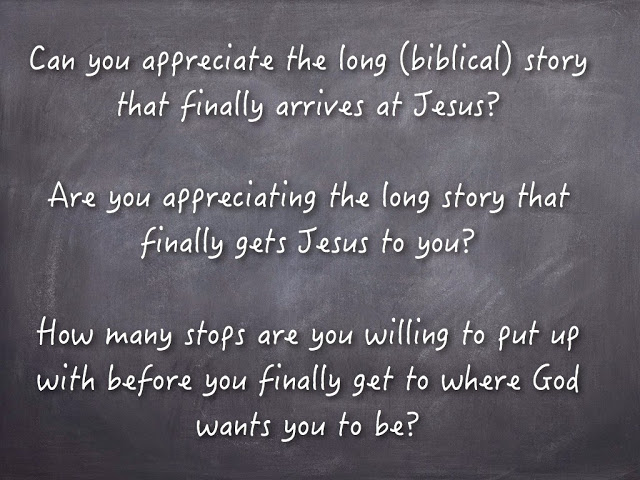
by Jonathan Manafo | May 26, 2015 | Sunday Conversations
Have you ever run out of gas? If so, I know how you feel. Besides feeling a little dumb, you also feel stuck; either on a highway or some random road, and if you as unlucky as I was, not close to a gas station.
Have you ever been locked out of your house? Same kind of feeling – stuck. My nephew was locked out of his uncles house a few weeks ago while visiting Montreal. He had one thing to do while everyone was out running errands – watch the dog (who was also a guest that day). Something attracted him to walk outside, that would be the trampoline. He stepped outside (underdressed) to play around for a minute or so. When he decided to go back in, he realized the door was locked. He had two worries, one was that his dog would pee in his uncles house, the other was that he would freeze (it was in the lower single digits, celsius, and he was only wearing shorts and a t-shirt). He was ‘stuck’ outside for 2 hours.

I’m sure you’ve been placed on hold from time to time. We call an office and either half way through the conversation or even before we get started, we are asked to hold. As polite as the receptionist sounds, we are still left with a decision, do we wait, do we hang up, do we call back? Just like running out of gas and locking yourself out, being on hold feels like your stuck – waiting for ‘pause’ to turn into ‘play’.
What happens when life gets put on hold? When you feel like you should be moving forward, you are instead stuck in your tracks. You get ‘the call’ or ‘the letter’ that puts everything to a halt – those become really tough seasons to get through. We want to look for silver linings, but if we’re honest, the grey clouds are lined with even darker grey lines.
U2 wrote these lyrics a few years ago…
You’ve got to get yourself together, you got stuck in a moment, and you can’t get out of if
Don’t say that later will be better, you got stuck in a moment, and you can’t get out of it
Acts 27 & 28 are about yet another stop along the way in Paul’s journey to Rome. We know by this point in the story that Paul is on his way to Rome – Jesus says he’ll get there and he most definitely wants to get their too.
Even though the accusations from the previous chapters have been dropped (thanks to Festus & Agrippa) Paul still has an appointment with Caesar. He asked for one, so he’s getting one. This get’s him on a ship with over 200 other prisoners on its way to Rome.
To make a long story short (which Luke doesn’t do in Acts), Paul and the crew get stuck along the way. Paul advises the leaders and passengers to stay at the Good Harbour (Fair Havens) in Crete. It’s storm season and Paul thinks it’s best to hold off, but they don’t want to. You know how it is? You’re so determined to get ahead that you unwisely try to push forward, even when the risks are too great. Wouldn’t you know it, shortly after they set sail, the bad weather hits. Luke describes the 14 day period as so dark that you couldn’t see any stars at night or the sun in the day. Somehow, after throwing much cargo off the ship, they manage not to sink. After the weather finally passes and they feel like they just might make it, they hit a reef and are stuck quite a ways off shore. Many days before, Paul had a dream that every one would live, but the boat would be a write off. With no boat left they all decide to swim to shore. Paul’s dream comes true, they all make it to shore.
One problem, the shore they hit wasn’t Rome, it was Malta. Think about this for a minute. Paul’s long journey, including flogging, interrogation, prison, persecution, debates and bad weather ends not at Rome (yet) but at Malta. Get this, they were STUCK in Malta for 3 months. What happens in Malta teaches us something, both about Paul and about us.
This crew of prisoners were treated very well by the natives of this island. The Maltese were hospitable to Paul and the rest of them. Paul’s understanding of love and grace are expanded by the Maltese. Their behaviour affirms in Paul what it means to be hospitable, even or especially, to those who are not like you. There was no reason for the Maltese people to help them, but they did. They kept them warm by a fire, found them food and found them a place to rest.
Something else happened on this Island. Paul wasn’t only served by the Maltese, he served them. Both with chores as well as gifts of healing and helps. Paul healed many people on the island, which of course communicated the power of Jesus that Paul possessed.
What’s Luke trying to tell us with this story?
Even though Paul had a destination in mind, he didn’t wait to get their to use his gifts. He realized that even though he wasn’t in Rome, God cared about these folks too, so he showed them God’s love through healing and help. He may have been stuck, but he wasn’t going to let it slow down the calling on his life. The purpose of Paul getting to Rome was to share the gospel with gentiles. Here he is stuck with…more gentiles…so he helped and healed in the name of Jesus.
Too often we’re so stuck on our goal – on the place we think we’re supposed to be and can’t see the opportunity that’s right in front of us. When you’re stuck, you can pray, “God, help me, get me out of here.” but you can also pray, “While I’m here, maybe you want to use me?”
Is it possible that God wants to use our STUCKness for his purpose. I’m not saying that he gets us get stuck (although he may), but I am saying that instead of complaining or twiddling our thumbs (like we do when we’re on hold with a call) we can ask God to use us where we are – in the present moment. Sometimes it’s easier to wait for the next step than it is to be creative in your present circumstance.
Jeremiah 29:11 says this, “I know the plans I have for you…plans to prosper you and not to harm you…plans to give you a hope and a future.” These words were given to Israel while they were in Exile. They were stuck, they were on hold, they were going nowhere fast, yet God reminded them that even though they feel stuck, he is still pulling them forward. Also while in Exile God tells Israel to pray for the peace and prosperity of their city (Babylon). Pray for a place that they don’t even want to be in? Pray for neighbours that they never wanted to live beside? What’s the deal with that? Even though we think we’re stuck and have no where to go, we can still live out our God-given calling and make a difference where we are. Don’t lose the dream God gave you – don’t forget about the future God is calling you to – but also don’t miss the opportunity to live, love and serve in the moment and the place where you find yourself.
Think about this…
– People who follow Jesus should never worry about being on HOLD
– God’s purpose follows us into the waiting room
– Keep living, serving, giving and being who God called you to be…even when you’re stuck…even when you’re on hold
– You’ll eventually reach your potential, as Paul did, but in the meant time, serve God in Malta
– – – – – – – – – – – – – – – – – – – – – – – – –
small(er) group questions:
Any funny stories about running out of gas or getting locked out of your house?
Running into road blocks and getting stuck seems to be a theme in these last few chapters of Acts. Do you think it’s something we should get used to?
Is it fair to say that Paul learned about hospitality from the Maltese people? Do you think a light went on about how important it is for followers of Jesus to treat people well…especially those who are different?
How can hospitality communicate the best of humanity and the best of God’s story?
Even though Paul hit yet another road block, he served and healed and helped while in Malta. What does that teach us about when we’re stuck in a moment and can’t get out of it?
– Can we pray, “God, this sucks, but maybe you want to use me here, in this place, with these people.”?
How does this verse from Jeremiah resonate with you? “I know the plans I have for you…plans to prosper you and not to harm you…plans to give you a hope and a future.”

by Jonathan Manafo | May 20, 2015 | Sunday Conversations
There are some stories worth repeating – we would agree that the good stories should be retold over and over again. You’ve probably been at a party and one of friends said to another, “Hey man (or girl), you gotta tell everybody that story about _______”. As they proceed to share it, you wish you had a story as good to share.
 Good stories have always been repeated. Good/Popular songs get played on the radio over and over, Good movies get watched, rented or downloaded more than other movies. And sitcoms or tv dramas show reruns for years to come.
Good stories have always been repeated. Good/Popular songs get played on the radio over and over, Good movies get watched, rented or downloaded more than other movies. And sitcoms or tv dramas show reruns for years to come.
For example, the Beatles song, ‘Yesterday’ has been played more than 7 million times on the radio (this doesn’t count the internet play it gets). Seinfeld has made more $3 billion in repeat fees (and 1/2 of that went to Jerry:). Starwars IV (the first to come out) is the 2nd most watched movie on TV reruns.
If you take the time to read through the whole book of Acts (as we at The Village have been adventurous enough to do), you’ll notice that one story gets repeated a few times. The story I’m referring to is Paul’s conversion. As Luke lays out what makes it into his second volume (his gospel being his first volume), he chooses to include Paul’s conversion story three times. Acts 9, 22 and 26. They’re all basically the same, but set in a different context. In Acts 9 we find out that this Pharisee who was responsible for Stephen’s death just a couple of chapters before has had a complete transformation. In Acts 22, Paul is defending himself from some accusations (which is a normal thing for Paul). In Acts 26 Paul is once again defending himself, and in this current hearing with King Agrippa begins to share who he used to be (a fundamental religious Pharisee) and how he became a follower of Jesus who is now called to share this new gospel with the world.
We enter this scene with Governor Festus trying to figure out if Paul should be convicted of anything or if he should be let go. He’s been accused of blasphemy from the Jews. Festus welcomes King Agrippa and his sister Bernice to be part of the discussion and perhaps write a letter to Caesar to be sent with Paul.
With King Agrippa wanting to hear from Paul, Paul takes this opportunity to share his (conversion) story (Acts 26). Here are the parts of his story that Luke wants us to hear…again…
Paul ‘used to be’ obsessed with putting an end to the early church movement. He was instrumental in putting Jesus’ followers in prison, and of course ensuring that many of them would die. Think about the things people are ‘obsessed’ with today: sports, gaming, netflix, etc. Paul’s obsession was watching early Christians being stoned (Acts 7). But something clicked in Paul – he realized that the hope he had in God was fully realized in Jesus. The people he was trying to stop were the ones who discovered God’s hope for real – Jesus. Paul couldn’t get past Jesus, until of course Jesus got his attention.
In Acts 26:12-18, Paul shares the heart of his conversion story. He tells us that Jesus got his attention, Jesus woke him up, knocked him off his horse (literally). In Paul’s conversion we see three things that change with Jesus: blind eyes are opened, darkness turns into light, and we are no longer are under Satan’s power, but God’s.
When you look closely, Paul’s story is more about ‘calling’ than it is about ‘conversion’. It’s clear that God didn’t get Paul’s attention simply for him to change churches…or synagogues, he changed him so that Paul could make a difference and share this story with the world. Jesus never saves us to sit, he saves us to serve. Paul’s big moment on that Damascus road turned into so many more moments where God used him.
How about you? Has God’s transformation in your life given you the desire to put a towel over your arm and serve? As grateful as you are and should be about God’s forgiveness and grace, have you allowed Him to turn your conversion into a calling? What are you called to? Who are you called to?
This last part of Acts 26 may be my favourtite. First, Festus tries to say that Paul is crazy. In Paul’s return comments, he appeals to King Agrippa and asks if he believes. King Agrippa’s response is humourous. Here’s the exchange…
Agrippa says, “Do you think that in such a short time you will persuade me to be a Christian?”
Paul’s answer is classic, “short time or long I pray to God that you and all who are listening to me today may become what I am, except for these chains”. (love the inclusion and joke about the chains)
After all that Paul has gone through to get a ticket to Rome, he potentially blows it with this comment. Why? Because he really does believe in what he’s preaching. He really does want people to discover Jesus as Lord. He really does believe that everyone needs God. So he sees an opportunity to lead a King to ‘The King’, and he takes it and makes the most of it.
From what we see in Acts, Paul probably used his story many times. He wanted others to find God too. He wanted others to be awoken to who Jesus was and is.
Here are a few questions to think about…
– What
did…or is…God saving you from?
What
is…God calling you to?
– What
stories are you keeping to yourselves?
What story should you
be sharing?
– If
you’ve got no moment to look back on…no turning point…how about asking
God to get your attention…whatever way he needs to get it?
– – – – – – – – – – – – – – – – – – – – – – – – –
small(er) group questions:
What’s one thing you say about your self over and over again? A trait you think describes you well that something people would like to know?
What’s one movie or show that you can watch over and over and not get sick of?
Paul talks a lot about who he used to be. Is there a past part of you that your thankful is now in the past? You feel like sharing?
We tend to think that Jesus stands at our door knocking and won’t come in unless we open the door. (I think Rev 3:20 lends itself to that) However, what do we make then of Paul’s experience. It seem like Jesus barged into that door. He got Paul’s attention. He woke him up.
– Is it one or the other…or both/and?
God’s desire seems to be two-fold: He wants to change us and he wants to use us. How long does it take to go from step 1 to step 2? Or can God use us while we’re still ‘becoming’ Christians…while the change is still in progress?
Paul took a risk in answering King Agrippa the way he did (Acts 26:28-29). What was it about Paul that gave him such confidence? Can we have a similar confidence while still being true to ourselves and not looking too fanatical in front of friends?
What do you need to be praying for tonight?

by Jonathan Manafo | May 12, 2015 | Sunday Conversations

I was 19 years old when I headed off to University. I was presently living in Montreal and would be spending the next 4 years in Peterborough. Before heading off I agreed to play with a band for an important event that would happen that October. This meant traveling back (for rehearsals) home on weekends leading up to the event. I purchased a multipack of bus tickets and was excited for the event and for the rides. Little did I know that what I thought would be a 5 hour trip, turned into over 7 hours each and every time. That’s long. Why? Because this bus stopped at (what felt like) every town along the way. And if that wasn’t enough, I had to make a transfer in Ottawa before finally getting on the homestretch to Montreal. Those felt like the longest trips ever, not because of the distance, but because of the stops along the way. Years later I would take a train to Sudbury that felt equally as long. Why? Same reason – all the stops along the way.
As we head into this homestretch in Acts we are realizing that Paul’s road to Rome is taking forever. So many stops along the way. Unlike small towns with bad restaurants (like the ones on Hwy 7 to Montreal), Paul’s stops include death threats and hearings and clever speeches to get him out of trouble.
After hearing from Jesus (Acts 23:11) that he will testify in Rome, Paul is made aware of a conspiracy to end his life. Forty Jews have vowed to not eat or drink until Paul is dead. (Acts 23:12ff)
Not sure if any of us can relate to this? I’ve had people not like me, and perhaps some even played some pranks to make my life a little miserable. But this conspiracy is serious. Hockey players vow to not shave until they win the Stanley Cup – these Jews were determined to fast until they got what they wanted, Paul’s dead body.
Paul escapes this present obstacle in a surprising way. We don’t read much of anything about Paul’s family in the NT, but in this text we read that his nephew warns Paul about what’s going on, and that his nephew makes the Roman commander in charge of Paul aware of this situation.
What transpires next is very cool. In order for Paul to have a fair hearing, the commander orders that Paul be escorted by 470 men (to Caesarea). This was so the people who wanted to harm Paul would not be able to get through. The text says there were 200 soldiers, 70 horsemen and 200 spearmen. That seems a lot more elaborate than any witness protection program I’ve watched in the movies.
Felix, the governor, makes this hearing a reality. They bring together both sides of the story: The Jews (who are accusing Paul of blasphemy and stirring up trouble) and Paul (who says he’s done nothing wrong, if anything, he’s simply helping people continue on the ‘God’ road they’re already on, just pointing out that Jesus is the adjoining road). The interaction in Acts 24 is worth reading. Paul is his usual clever self. He uses two terms that are important for us to note: The Way & Resurrection.
– The Way is what the early followers of Jesus were called. Paul and the early church have come to realize that Jesus is the WAY (like we read about in John 14) and that the path the Jews have followed up until now is fulfilled in Jesus, not halted by him.
– Resurrection is a common denominator Paul would like to use to bridge his Jewish family and his Christian family. Jews believed in resurrection, but they had a hard time believing that Jesus’ resurrection was the beginning and the initiation of our own. His resurrected life was the sign of hope for the world. Paul desperately wanted everyone to know that, especially these Jews.
One more stop for Paul in this (long) section of Acts. There’s a leadership change, from Felix to Festus (not brothers). In Paul’s exchange with Festus, he appeals to have a meeting with Caesar himself. This is the highest hearing Pau could get, but it’s also his way to get to Rome. Caesar doesn’t come to you, you go to him, and he is…in Rome.
Here are some things to be thinking about in response to this text…
– – – – – – – – – – – – – – – – – – – – – – – – – – – – –
small(er) group questions:
Can you share any travel stories? Ones about trips that just took forever because of all the stops along the way?
Paul is on a mission to get to Rome, yet he can’t seem to get there without obstacles and trouble. How do the words in Acts 9:15-16 & Matthew 10:16-20 help us understand this better?
Should we, today, in 2015, expect any of these kinds or other road blocks in our journey with and for Jesus? Is there ‘good’ trouble to get into while following Jesus?
The early church were called ‘people of the way’. How would you describe our church community or the church in 2015? What kind of phrase or word would do us justice?
A helpful analogy to see why Paul is so keen on pointing people to Jesus is this: If we look at God’s story through a camera lens, we should have Jesus as our focus, and everything else in the picture is there to point us to the focal point. Is that helpful when it comes to putting the OT and NT in it’s proper context? Why is Jesus the focal point?
Before you close up tonight, if you still have time, try and discuss some or one of the questions from the above picture…
– Can
you appreciate the long story that finally arrives at Jesus?
– Are
you appreciating the long story that finally gets Jesus to you?
– How
many stops along the way are you willing to put up with before you get to where
God wants you to be?

by Jonathan Manafo | Nov 12, 2014 | Sunday Conversations
Can you think of a time that you had to say good bye? Not a ‘see you tomorrow’, but a ‘goodbye for a long time, possibly forever’ kind of goodbye. We don’t understand what those are in our era. I don’t want to underestimate the parting of ways, but with phones, internet, texting, facetime, skype, etc, our goodbyes don’t last too long. We say goodbye one minute and are texting our friend the next; liking a post on facebook, favouring or replying to a tweet. Our goodbyes don’t have the same finality as they once did.
If you’ve ever worked with a group of people, leading and encouraging them for an extended period of time, you may know what it feels like to eventually say goodbye. I’ve had the opportunity to say farewell a few times in my life, and it wasn’t easy to settle on which words to share. It’s both tough and beautiful. Tough because you don’t want to leave a group you care about – Beautiful because your relationship to that point has given you an opportunity to share deep and challenging things on your farewell.

In Acts 20 Paul is sharing some farewell thoughts to a community that is dear to his heart. His longest pastoral stint was in Ephesus. It’s to these early Jesus followers that he shares his heart. He asked the Elders of the community to come meet him where he is. It would take three days to get a message from where he was to Ephesus, then add a few days for the Elders to get back. How important was this farewell meeting to make people go through this much trouble? Well, Paul was on his way to Jerusalem. He knew that they would never see each other again. He would be leaving the church in Ephesus totally in their hands…and God’s of course.
This particular speech was the only recorded one in Acts directed solely to Christians. Other speeches/sermons were for pagans, potential converts, hostile religious leaders, but this one is for a church Paul cared for and loves deeply. In it, Paul includes a few things about him and some advice for them.
In this speech…
….we find out…Paul’s devotion to the gospel, the Spirit and the church…
Paul reminds them about how he lived and what he taught. They go hand in hand. He shared all he could about Jesus, with humility, in public and in homes. Paul lets them know that following him would lead them to following Jesus (cf. 1 Cor 11:1, Phil 4:9). He then uses this word that lets us into how committed he was to the mission of Christ. “I am compelled to go from city to city…even though I may will trouble there.” The word compelled, is also written as captivated (in other translations) and can be translated as imprisoned. Paul felt like he could do nothing else but serve Jesus in this way.
Have you ever felt this? Either for a season or a moment? That you could do nothing else than what God was calling you to do? Did you listen? Did you follow your captivated heart? I hope so. It’s not easy…to give a moment, a day, a week, a season, or your life, but when your compelled, you just don’t feel like you can do anything else. Paul wanted to remind them this as he prepares to leave.
He then turns from his life with them to their new reality without him.
…we’re given…next steps in moving the church forward…
Paul is concerned, like any fatherly leader would be, about his family. He wants them to succeed in his absence. And of course he would, because he is a good leader. Good leaders want those who follow them to succeed after they leave. It’s the selfish leaders who don’t care how things turn out when they’re not leading any longer.
Paul tells them to:
– Keep Watch (for obstacles heading their way)
– Be Shepherds (lead and nurture as Paul once did)
– Be Alert (for evil and disruption to their forming Jesus community)
The most important bit of advice may be in verse 32, “Now I commit you to God and to the word of his grace, which can build you up and give you an inheritance…”. It’s like he’s saying, ‘The story you’ve received, the gospel you’ve been taught, the word of grace you’ve welcomed…it will build you up and give you a future.’
Paul felt that these things would enable them to move the church forward and continue the work of Jesus in their present and future days.
This leads us to the inevitable: Paul is leaving. They accompany him to the ship. They cry, they hug, they grieve, because they will not see each other again. We can’t appreciate what this means for them. We don’t have the same finality in our departures these days. This was a final goodbye. Yes, they had a hope of heaven, but who would teach and continue to nurture these young christians in their faith? There was a deep community that grew in this church. They loved and appreciated each other. This farewell meant something to both Paul and the Ephesian Christians. Paul got to remind them about all they had learned about Jesus. They received valuable instruction to continue what God started in them. What do we learn? Hear are a few questions that might help us figure that out.
* Will
we allow God’s spirit to so captivate us that we find ourselves consumed in
doing God’s good work in the world?
* Will
we appreciate God’s story in such a way that we ‘stay awake’ and keep others
‘alert’ to it?
* How
much of a community experience are we willing to have? Hopefully enough of one
that will bring grief our way if we find ourselves saying goodbye one day –
That’s when you know it’s good!
* If
you had one last chance to talk to someone you cared about, what would you say?
How would you end things? Would you pray for their future? Would you give them
a word of grace that builds?

by Jonathan Manafo | Jul 3, 2014 | Sunday Conversations
I just love the word ‘becoming’. It says so much about where I am as a person, as a husband, as father, and as a Christian. I can’t take the credit for this word. My friend introduced it to me a few years ago in the context faith and referencing ones spiritual journey. Since then it has made me at ease with where I am at things, while still being very challenged to grow as one who follows Jesus.

Acts 18 introduces us to an individual who, by all accounts
is very accomplished. Apollos comes on the scene mid way through this chapter.
He is first seen in Ephesus. Luke tells us that he’s educated, eloquent, and
knows the way of God & Jesus. Yet while debating (talking/teaching) in his
first appearance in Acts, Aquilla & Pricsilla feel the need to take him aside
and make things even more clearly to him. What is worth noting is that Apollos
doesn’t object. Luke doesn’t say that he was offended or that he didn’t feel
the need to be taught. We do read on to see that after this, he goes on to lead
other to Jesus.
Here’s what we learn about ‘becoming’ followers of Jesus
from this text:
1) Becoming is an ongoing journey.
None of us have arrived. All of us are hopefully a little
further ahead than when we started, but not yet where we want to be. Becoming a
Christian is an ongoing journey: one we will be on our whole lives. Some may
see this as depressing, because they never feel the sense of accomplishment.
Others hopefully will see it as very appealing and refreshing.
No one likes a know it all: you know the guy at work that
can never learn anything knew because he knows everything. Christians can’t be
those kinds of people. Instead, we have be the most teachable people around.
Apollos knew lots, he was eloquent, and had lots to offer, but he still had
more to learn. And it’s worth noting who taught him: two business people. The
gospel is about a kingdom that doesn’t do things the way we think it should.
Business Entrepreneurs teaching spiritual teachers more about God doesn’t make
sense. Unless of course, you’re in God’s economy, where experience and
relationship go a long way.
2) Becoming is about green lights to move forward and make a
difference.
In our society we feel the need to get permission or a piece
of paper to contribute to society. We look for degrees and certificates. We can’t
wait for those kinds of things to make a difference in our world. In God’s
grace, as soon as we start walking, we can start serving. Now don’t hear this
the wrong way. Degrees are good. Education is important. Learning (as we just
mentioned) is essential. But we need to couple our learning with our action. We
must put our education to quick use and get onto the field. There’s work to be
done, lives to be changed, neighbours to love, cities to invest in. Get your
education, get your degrees, get your certification, but by all means don’t
wait for graduation day to get on with it – start working, start serving, start
creating today. God will help you, and will use you to do some real significant
things that make our world better.
So, you become a Christian? Me too. Let’s become one
together!









